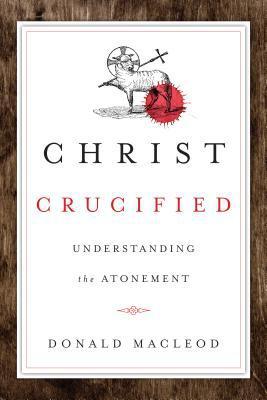
Christ Crucified: Understanding the Atonement, Donald Macleod. Downers Grove, IL: InterVarsity Press, 2014.
Summary: A thoughtful, contemporary restatement of the classical doctrine of the atonement including different contended terms in reference to the atonement including substitution, expiation, propitiation, satisfaction, and victory.
The cross is not only the most significant symbol of Christianity, but this act, and its meaning is central to Christian hope. The cross also raises telling questions, of which the most significant are: Why did Jesus die? Was this truly necessary? What did this accomplish? And, what does this mean for us? When we get beyond the vague sentiments that this “shows us the love of God” (how does the cruel death of a man on a Roman gibbet show love?) or that “he died for us” (why did he choose to die when he could have avoided it? how can one die for us all? why was this death necessary? what about us needed dying for?) we are faced with questions like these whose answers take us into the deep purposes of God and the raw truth about the human condition. Hard questions, and yet at the end, profound good news.
Donald Macleod in this work explores the death of Christ and its significance. The book is in two parts. The first is a meditation upon the events of Maundy Thursday and Good Friday and their theological significance. Of particular value in this section in light of questions raised about the idea of Christ’s death as a substitution for us, which some have alleged to be “divine child abuse” Macleod provides this striking defense:
’the child-abuse charge ignores the clear New Testament witness to the unique identity of Jesus. Not only was he not a child; he was not a mere human. He was God: the eternal Logos, the divine Son, the Lord before whom every knee will one day bow (Phil. 2:10). This is no helpless victim. This is the Father’s equal. This is one who in the most profound sense is one with God; one in whom God judges himself, one in whom God condemns himself, one in whom God lets himself be abused. The critics cannot be allowed the luxury of a selective use of the New Testament. It is the very same scriptures which portray the cross as an act of God the Father which also portray the sufferer as God the Son, and the resulting doctrine cannot be wrenched from its setting in the Christian doctrine of the Trinity. The ‘abused child’ is ‘very God of very God’. It is divine blood that is shed at Calvary (Acts 20:28) as God surrenders himself to the worst that man can do and bears the whole cost of saving the world. (p. 64)
The second part then takes seven words that are used to describe different aspects of Christ’s atoning death: substitution, expiation, propitiation, reconciliation, satisfaction, redemption, and victory. A number of these are often contended against as well, yet he defends these with careful textual study and devotional eloquence. His discussion of the use of hilasterion as the word used for ‘mercy seat’ in the Greek Old Testament is an example, giving us the vivid image of the place where sin is expiated and the judgment of God against sin propitiated. I am hardly new to such discussions, but Macleod’s clear, theologically acute, and devotionally rich writing left me pausing to rejoice again in familiar truths understood with freshness, and in some instances greater depth.
The uses of this book, it seems to me are several. First, it is one to be used devotionally in measured, thoughtful reflection, perhaps reading a section of a chapter at a time. Second, it is a significant book for any who bear witness to the good news of the cross. Any thoughtful person will raise questions similar to those I mentioned at the beginning of this review, and to be able to speak biblically, clearly, and joyfully of the work of Christ is our great responsibility and privilege. Finally, those who raise the question of the cross as divine child abuse, or repudiate the idea of penal substitution need to engage with Macleod’s writing, and not the straw men representations of the doctrine of the atonement often cited in their arguments. I would set this alongside John Stott’s The Cross of Christ (reviewed here) as one of the very best books I’ve read on the cross.
Editor’s Note: Thank-you to Bob Trube for sharing his reviews with Emerging Scholars! Bob first posted the above review on Bob on Books. ~ Thomas B. Grosh IV, Associate Director, Emerging Scholars Network
Bob Trube is a former Associate Director of Faculty Ministry and Director of the Emerging Scholars Network. He blogs on books regularly at bobonbooks.com. He resides in Columbus, Ohio, with Marilyn and enjoys reading, gardening, choral singing, and plein air painting.

I look forward to reading this. The Atonement properly understood involves all of those words he uses. I sometimes wonder if they are there to not only fill out the meaning, but also create differing avenues to the cross. Those who are under the power of sin’s power (e.g. addiction) need a word on victory, those feeling guilt and shame, expiation.